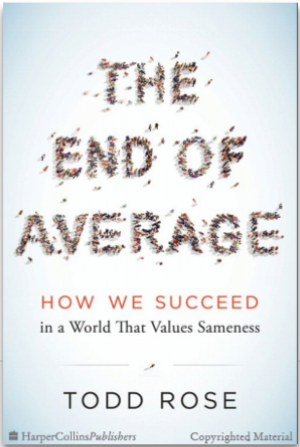

Even If We Work Smarter, We Still Need To Work
Source/Author: Mike Murphy, Headmaster
April 15, 2016
In his book, “The End of Average”, Todd Rose shows how highly engaged and competitive workers, students, athletes and others share some common experiences and mindsets. They are in environments that encourage them to use their individual strengths. Rose’s focus on the individual rather than the average supports the research of Marcus Buckingham and Dr. Courtney McCashland, who have developed the StandOut 2.0 strengths assessment. Buckingham maintains that the most important reason high performers stay in their jobs or continue to pursue their goals is that they have a chance to use their strengths every day and they clearly understand what is expected of them.
One of the reasons I am excited about what is happening at Shorecrest and other progressive schools around the world is we continue to find new ways to allow students to use their strengths on projects and problems that matter to them. In our Lower School, Dr. Bianco will often point out that the casual observer sees children having fun when they are building, making or doing project work. The insightful observer, she will say, realizes that these children are working hard.
It is really important that our children learn to work hard. Yes, we want them to be creative and find different and better ways to approach problems and challenges, but at the same time, I want them to have a sense of urgency about their work. I want them to realize that there are other people out there who are just as smart and just as creative who do have a sense of urgency and are working hard to be better than anyone before them.
Whether in the classroom, on an athletic field, in a computer lab, a robotics competition, a Makerspace, a kitchen… you name it - someone is out there trying to build a better mousetrap and to be ready to break whatever record the past champions have achieved.
During Upper School Service Week and over spring break, I was able to observe some great examples of young people who have work ethics that suggest they may earn themselves a seat at the “Boardroom Table” or the top of the champion’s podium. Some of our young people have learned to work hard regardless of the task. They try to do their best at every task ranging from AP Calculus to shoveling gravel. Others have not. In some cases, I wonder if they think a parent or other guardian will come along and do the work or pave the path for them. That seems to be a very dangerous sense of entitlement in a world where knowledge and opportunity are far more accessible than ever before.
Did anyone notice that high school athletic teams from around the county were playing local baseball, basketball and lacrosse while on their winter and spring breaks? Our own baseball team played a team from Atlanta that used spring break to sharpen their skills. Our basketball teams played in tournaments throughout their winter break. No doubt, the coaches and players on these teams are making a special commitment. If the student athletes do not really love the sport, the “breaks” can easily turn into a “Brake.”
While we want our students to be socially and emotionally healthy, we also want them to be committed and I dare say tough enough to compete with the best students and athletes from around the world. I want our children to enjoy the work, training and development experiences available to them. At the same time, I want them to learn that sweat, stress and discomfort can be positive experiences especially when we/they are trying to do something meaningful.
Cheers!
Mike
























